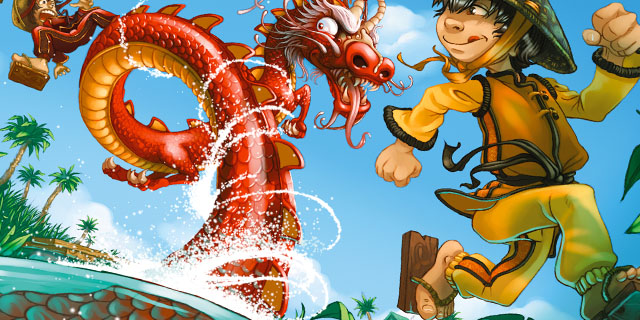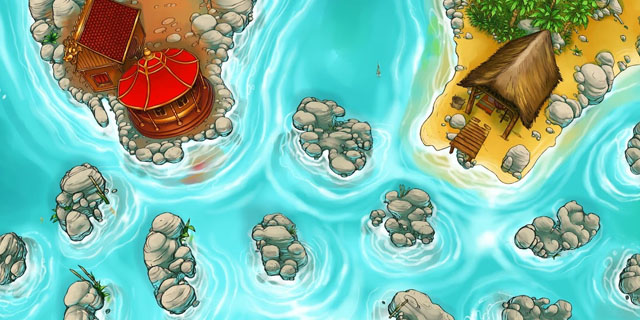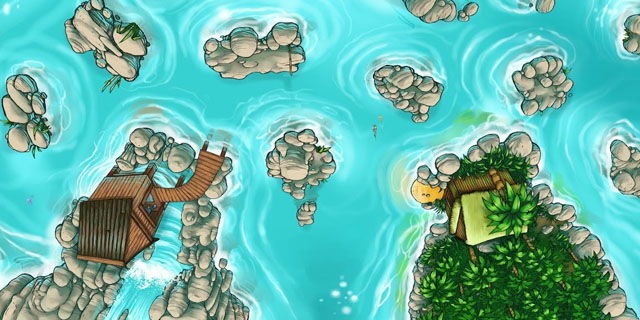
Roberto Fraga’s Dragon Delta, first published in 2000, was nominated for several awards that season due to its simple-yet-engaging cross-the-river gameplay for up to six players. Similarly to RoboRally, each player programs five actions each turn, but whether or not those actions will play out as intended remains to be seen. Dragon Delta has been out of print for a while now, but Asmodee recently reissued it under the new name of River Dragons, which is the version I’ll discuss here, although with one exception the two editions are essentially identical.
Each player has a pawn that they need to move to the other side of a rock-filled section of the river. To accomplish this, they will need to use their supply of six planks of varying lengths, but each plank needs to be supported by a stone in order to provide a makeshift bridge. Eight action cards allow you to place one or two stones, place one or two planks, move along one or two planks, pick up an object from the board or jump over an opposing pawn in your pawn’s way. In addition, each player has a dragon card corresponding to each other player. A dragon card of your color will cancel out whatever non-dragon card you have played in that same position, which can (and will) seriously disrupt your plans. The first player to reach the intended destination wins.

Seems simple enough, right? Well… it is. But there are a few complications that keep things interesting. Each stone placed on the board can only support up to three planks, for starters. If you were hoping to use a stone to expand your bridge network but other players use it first, you might need to recalculate your route. You don’t need to travel on your own planks, but you can’t pass through an opposing pawn unless you play the leapfrog card. On the other hand, if you play the leapfrog card and there is no pawn to leapfrog at the time, splash! Back to your starting village you go.
You also must execute the action you have selected whenever possible, even if it means placing a plank in a position that is of no use to you — or worse, helps your opponents. And then there’s the slight problem of plank length. You have to choose the plank(s) you want to place without measuring the distance between the stones you want to use, so if you choose one that is too short, you have wasted that action (you get to keep the plank, at least). Picking up an unused stone or an unoccupied plank can cause serious problems for anyone acting after you, although there are some restrictions as to what planks you are allowed to grab; you can’t have two planks of the same length or more than two colors of planks in your possession at any given time, so plan accordingly.

And then, of course, there are the dragons. As mentioned, they completely blank a player’s actions when played. But what you also need to consider is that playing a dragon effectively blanks your action as well. This is a race, after all, and taking time out to screw with one opponent might allow another one to gain precious ground. The closer you get to victory, the more you have to anticipate that others will try to keep you from winning, which creates an intricate game of second-guessing as you hope to program your crucial action in a position that isn’t canceled. If you get really lucky, especially in games with five or six players, maybe some of your opponents will double-up on your dragon in a specific position and give you a window of opportunity. But which one will it be?
In Dragon Delta and the beginner version of River Dragons, the board has rock islands printed on it that indicate where stones can be placed, with a one-stone-per-island limit. River Dragons offers an advanced version on the reverse side of the board that removes these islands, allowing you to place stones anywhere, but adding a lot of variability to the distance between them that can really mess up your plank-laying. I haven’t given that side of the board a shot yet, but I greatly look forward to the extra challenge. Not that the basic version isn’t challenging on its own!

In addition to the double-sided board, River Dragons also ups the ante in presentation with some of the greatest pawns ever. Reminiscent of Fisher Price “Little People” of my youth (which were thinner than the current models), these things are adorable and really make the game stand out. The cards also bear full illustrations instead of just icons (which are retained in the upper corner); this is a bit of a double-edged sword, however, as it can sometimes be confusing as to which cards do what, especially the two movement cards, but programming the wrong card isn’t always disastrous and players should learn which is which after a round or two.
There is no reading involved (in either version), so this makes a great family game (recommended ages 8+) and usually plays quickly (30-45 minutes). At an MSRP of only $40, this is a hard one to resist. For a lightweight offering, River Dragons is sure to make a big splash.



















